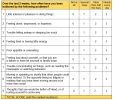Cognitive impairment, depression, and fatigue in post-COVID and post-vaccination syndrome: a large-scale cross-sectional study
[Line breaks added]
Background
Persistent cognitive difficulties are among the most prevalent symptoms observed after COVID-19. This study examined the neuropsychological characteristics, mental health and risk factors associated with cognitive impairment in patients with Post-Acute Sequelae of COVID-19 (PASC). In addition, differences regarding the cognitive dysfunctions between individuals with PASC and Post-Vaccination Syndrome (PVS) were explored.
Methods
Participants were consecutively recruited at the Post-COVID Center of the University Hospital Erlangen in Germany (12/2022–02/2025). Assessments included a broad neuropsychological assessment: d2 Test of Attention, digit span backwards from the Wechsler Memory Scale-Revised (WMS-R) and module 1 (formal lexical fluency) of the Regensburger Verbal Fluency Test (RWT), along with assessments of depression, fatigue, and inflammatory markers (C-reactive protein).
Results
The sample (N = 793, mean age: 46.1 ± 12.4 years; 66.8% women) included n = 723 PASC patients and n = 70 PVS patients.
In the total sample, deficits were most frequent in working speed (61.7%), attention (54.7%) and verbal fluency (48.8%); 30.3% showed multidomain impairment. Clinically significant depressive symptoms (64.5%) and fatigue (92.4%) were common.
Cognitive patterns, depressive symptoms and fatigue in the PVS group closely resembled those observed in PASC. In PASC, lower education, older age, depressive symptoms, and elevated CRP were associated with cognitive impairment.
Conclusion
Cognitive impairment is highly prevalent in PASC and PVS and appears to be influenced by both psychological and biological factors. Similar patterns identified in PVS suggest possible shared mechanisms. Further research is needed to clarify trajectories and optimize treatment strategies.
Web | DOI | PDF | European Archives of Psychiatry and Clinical Neuroscience | Open Access
Hanc, Evelyne; Koller, Katharina; Herold, Regina; Erim, Yesim; Morawa, Eva
[Line breaks added]
Background
Persistent cognitive difficulties are among the most prevalent symptoms observed after COVID-19. This study examined the neuropsychological characteristics, mental health and risk factors associated with cognitive impairment in patients with Post-Acute Sequelae of COVID-19 (PASC). In addition, differences regarding the cognitive dysfunctions between individuals with PASC and Post-Vaccination Syndrome (PVS) were explored.
Methods
Participants were consecutively recruited at the Post-COVID Center of the University Hospital Erlangen in Germany (12/2022–02/2025). Assessments included a broad neuropsychological assessment: d2 Test of Attention, digit span backwards from the Wechsler Memory Scale-Revised (WMS-R) and module 1 (formal lexical fluency) of the Regensburger Verbal Fluency Test (RWT), along with assessments of depression, fatigue, and inflammatory markers (C-reactive protein).
Results
The sample (N = 793, mean age: 46.1 ± 12.4 years; 66.8% women) included n = 723 PASC patients and n = 70 PVS patients.
In the total sample, deficits were most frequent in working speed (61.7%), attention (54.7%) and verbal fluency (48.8%); 30.3% showed multidomain impairment. Clinically significant depressive symptoms (64.5%) and fatigue (92.4%) were common.
Cognitive patterns, depressive symptoms and fatigue in the PVS group closely resembled those observed in PASC. In PASC, lower education, older age, depressive symptoms, and elevated CRP were associated with cognitive impairment.
Conclusion
Cognitive impairment is highly prevalent in PASC and PVS and appears to be influenced by both psychological and biological factors. Similar patterns identified in PVS suggest possible shared mechanisms. Further research is needed to clarify trajectories and optimize treatment strategies.
Web | DOI | PDF | European Archives of Psychiatry and Clinical Neuroscience | Open Access

